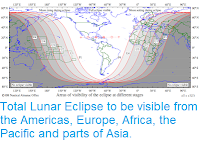At 9.07 am GMT on Tuesday 19 February 2019 the Moon will be at its closest
point to the Earth in 2019, at a distance of 356 761 km. his will fall six hours and forty six minutes before the Full Moon, at 3.53 pm, making it particularly large in the sky. The Moon completes one orbit
about the Earth every 27.5
days, and like most orbiting bodies, its orbit is not completely
circular, but slightly elliptical, so that the distance between the two
bodies varies by about 3% over the course of a month. This elliptical
orbit is also not completely regular, it periodically elongates then
returns to normal, making some perigees closer than others. These cycles
mean that the Moon often reaches its furthest point from the Earth
(apogee) of the year in the same lunar cycle, this time reaching 406 390 km at 11.27 am GMT
on Monday 4 March, which will be the most distant Lunar Apogee
of 2019.
Simplified diagram of the Moon's orbit. NASA.
Although this is the closest point to the Earth that the Moon has
reached this year, it is not exceptional. The Moon reached 356 565 km from the
Earth on 1 January 2018, and will reach 356 569 km from the Earth on 21 January 2023.
See also...







